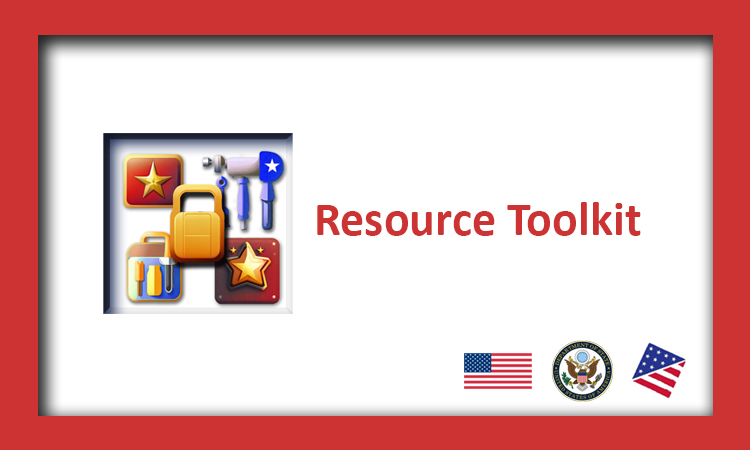DEMOCRACY
PROGRAM TOOLKIT FOR AMERICAN SPACES
This resource toolkit is designed for programming at American Spaces to define the values of democracy and explain the function, principles, and significance of America’s democratic system of government.

DEFINITIONS
- Popular Sovereignty: the authority and legitimacy of a government come from the consent and will of the people it governs.
- Natural/Individual Rights: fundamental freedoms and protections that every person inherently possesses, including freedom of speech and the right to life, liberty, and property.
- Checks and Balances: a system in government where different branches (executive, legislative, and judicial) have distinct powers and roles to prevent any one branch from becoming too powerful or abusing its authority.
- Political Pluralism: the presence of multiple political parties, ideologies, and perspectives in a society, allowing for diverse viewpoints and choices in the political process.
- Transfer of Power: the peaceful and orderly shift of authority from one government or leader to another, often occurring through elections or established constitutional processes.
- Self-governance: the ability of a group or community to independently make decisions, establish rules, and manage its own affairs without external control.
- Representative Democracy: a system of government in which citizens elect representatives to make decisions and create policies on their behalf, ensuring broader participation in governance.
- Public Participation: the involvement and engagement of the general public in decision-making and civic activities.
WHAT IS DEMOCRACY?
Democracy ideology, at its core, is a set of principles and beliefs that form the basis of democracy as a system of governance. It supports the idea that political authority and decision-making power should reside with the people, emphasizing the values of individual rights, equality, and the rule of law.
AMERICA’S DEMOCRATIC SYSTEM OF GOVERNMENT
America’s democratic system is characterized by a representative democracy where citizens elect officials to make decisions on their behalf. At its core is the belief in popular sovereignty, individual rights, and the rule of law. The United States operates with a federal system of government, dividing powers between a national government and individual states, which allows for both centralized and decentralized decision-making.
Free and fair elections, including presidential, congressional, and state-level elections, are central to the democratic process, ensuring the peaceful transfer of power. The system is underpinned by a strong commitment to civil liberties, political pluralism, and a system of checks and balances among the executive, legislative, and judicial branches. This complex interplay of democratic principles has been a defining feature of U.S. governance for centuries, shaping the nation’s political landscape and commitment to democratic values.
BIRTH OF U.S. DEMOCRACY
The Declaration of Independence, adopted in 1776, was a revolutionary assertion of the right to self-governance, asserting that governments derive their just powers from the consent of the governed. It not only declared independence from British rule but also laid the philosophical groundwork for democracy by affirming the fundamental principles of equality and individual rights.
The United States Constitution, ratified in 1788, was a blueprint for democratic governance. It established the framework for a federal democratic republic, with checks and balances among the three branches of government, a Bill of Rights to safeguard individual liberties, and a system of representation that allowed for citizen participation in decision-making.
MORE RESOURCES
Videos and Digital Media
- A collection of videos on democracy from the State Department.
- Democracy – A short introduction – An introductory video on democracy.
- Roots of Democracy in America – Video discussing the origins of democracy.
- The Democracy Group – Podcasts about democracy, civil engagement, and civil discourse.
- Foundations of American Democracy – Video discussing the basic ideas about government and U.S. history.
- How the Electoral College Works – Discussion of the structure of the Electoral College.
- How is power divided in the United States government – Belinda Stutzman.
- Three Branches of Government | Learn about the executive, legislative, and judicial branches – Two video analyses of the structure and function of the three branches of government.
- Foundations of American democracy | US government and civics | Khan Academy – Video playlist by Khan Academy that delves deep into the foundations of America’s democratic system of government.
- U.S. Government and Politics | Crash Course – Series of educational videos provided by Crash Course with an engaging overview of U.S. Government and Politics.
Articles
The Inter-American Democratic Charter, adopted in 2001, is designed to promote and protect democracy in the Western Hemisphere. The Charter emphasizes respecting human rights, the rule of law, political pluralism, and other key democratic principles. It also advocates for public participation and fair elections, which include secret balloting and universal suffrage.
Together, these foundational documents shaped the course of U.S. history and provided the essential framework upon which the United States built its enduring democratic system.

LESSON PLANS
History of America’s Government Institutions and Democratic Norms – This lesson plan includes videos and review questions that explain the fundamental democratic principles within America’s governmental institutions.
America’s Founding Documents – Transcripts of America’s founding documents and articles that discuss their histories and their relation to democracy.
Defining Democracy Lesson Plan – This lesson plan includes activities, readings, and questions that aid learners in defining democracy and comprehending the interconnectedness of democracy and community.
Democracy and the United Nations – This article characterizes democracy as a fundamental value of the United Nations.
Strengthening Democracy in America Series – This resource offers ten free courses for a comprehensive study of the U.S. political system.
DISCUSSION QUESTIONS
- How would you describe democracy in your own words?
- What are the key principles and values that underlie a democratic system?
- How do citizens participate in a democracy, and why is their participation important?
- Can you name a few countries, apart from the United States, that are recognized as democracies?
- What are some rights and freedoms protected in a democratic system, and why are these rights important?
The views expressed in these links and resources do not necessarily reflect those of the U.S. government.
Updated January 2025









